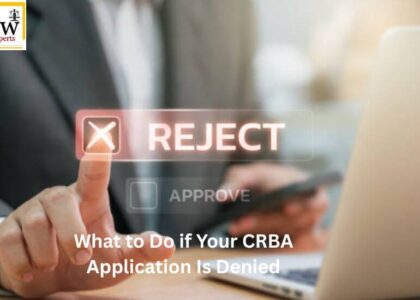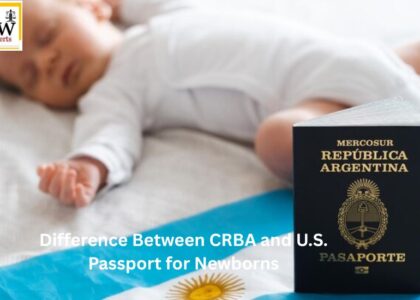Navigating the process of obtaining a Consular Report of Birth Abroad (CRBA) can be complex—especially when the child is born out of wedlock. Therefore, our legal consultancy ensures that families receive clear, accurate, and up-to-date information on securing the citizenship rights of their children under U.S. immigration law.
What Is a Consular Report of Birth Abroad (CRBA)?
To begin with, a CRBA is an official document issued by a U.S. embassy or consulate that serves as proof of U.S. citizenship for children born abroad to U.S. citizen parents. Essentially, this document functions like a birth certificate issued in the United States and is critical for obtaining a U.S. passport, enrolling in school, or accessing government services.
Eligibility Criteria for CRBA When a Child Is Born Out of Wedlock
Importantly, eligibility for a CRBA differs depending on whether the U.S. citizen parent is the mother or the father of the child.
1. If the U.S. Citizen Parent Is the Mother
In cases where the mother is the U.S. citizen, she must:
- Be a U.S. citizen at the time of the child’s birth.
- Provide evidence of having been physically present in the U.S. for at least one continuous year before giving birth.
- In addition, present documentation such as medical records, tax returns, utility bills, or employment records.
2. If the U.S. Citizen Parent Is the Father
On the other hand, if the father is the U.S. citizen, the requirements are more extensive and must be fulfilled before the child turns 18:
- Establish a biological relationship, ideally with DNA test results.
- Be a U.S. citizen at the time of the child’s birth.
- Provide a written acknowledgment of paternity under oath.
- Commit in writing to financially support the child until the age of 18.
- Prove physical presence in the U.S. for five years, with at least two years after age 14.
Essential Documentation Required for a CRBA Application
To proceed smoothly, it is crucial to gather the following documents:
- Child’s foreign birth certificate (translated, if not in English)
- Proof of U.S. citizenship of the parent(s)
- Evidence of physical presence in the U.S. (tax records, school transcripts, etc.)
- Proof of biological relationship
- Acknowledgment of paternity (for fathers)
- Financial support documents
- DNA results, if applicable
- Completed DS-2029 Form
Without these documents, the application may face significant delays or rejection.
Step-by-Step Process for Applying for a CRBA for a Child Born Out of Wedlock
Step 1: Schedule a CRBA Appointment
First, visit the website of the relevant U.S. embassy or consulate and schedule a CRBA appointment. Since slots are limited, we strongly advise booking early.
Step 2: Collect and Organize All Documents
Next, gather every piece of documentation outlined above. Ensure that everything is complete, translated, and legally verified, where necessary.
Step 3: Attend the Interview
Then, attend the scheduled interview. Both parents and the child should be present. During the session, you will present your original documents and answer questions to verify eligibility.
Step 4: Wait for the Processing Outcome
Following the interview, if your application is successful, the CRBA will be issued within a few weeks. However, processing times may vary by location and case complexity.
DNA Testing: When and Why It’s Required
In some cases, documentary evidence may not be sufficient to prove a biological relationship—particularly for U.S. citizen fathers. In such situations, the consulate may request DNA testing. Only labs approved by the U.S. Embassy are acceptable.
As a result, the DNA test becomes a pivotal part of proving paternity and advancing the CRBA application.
Legal Challenges and How to Overcome Them
Unfortunately, applying for a CRBA for a child born out of wedlock can bring legal obstacles, including:
- Paternity denial
- Lack of sufficient documentation
- Complications in countries with weak record-keeping or strict laws
To overcome these issues, we highly recommend seeking legal assistance. Moreover, early preparation and professional help can make a significant difference.
FAQs About CRBA for Children Born Out of Wedlock
Can my child get U.S. citizenship if I’m a U.S. citizen and not married to the other parent?
Absolutely. As long as you meet the legal criteria and can prove the biological relationship, your child may qualify for a CRBA.
Is there a deadline to apply for a CRBA?
While there’s no strict deadline, we advise applying immediately after birth. The application must be submitted before the child turns 18.
Can same-sex couples apply for CRBA?
Yes. U.S. law recognizes same-sex marriages and partnerships. Consequently, the same eligibility standards apply.
📞 Contact SJ Law Experts Today
Trust SJ Law Experts to handle your case with professionalism, empathy, and precision.
📌 Schedule Your Legal Consultation:
- 📱 WhatsApp/Phone: +92 (0) 335-411-2288
- 📧 Email: SJLawExperts@gmail.com
- 📍 Office: No. 1, First Floor, Al Anayat Mall, Above Faysal Bank, G-11 Markaz, Islamabad, Pakistan
Why CRBA Is Critical for Children Born Out of Wedlock
Without a CRBA, your child:
- Might not be recognized as a U.S. citizen
- Cannot apply for a U.S. passport
- May be ineligible for educational, healthcare, or employment benefits
- Could struggle with legal documentation throughout life
Therefore, applying for a CRBA is not just a bureaucratic step—it’s a legal safeguard for your child’s identity and future.
Conclusion
In conclusion, applying for a CRBA for children born out of wedlock requires careful preparation, legal knowledge, and timely action. From gathering documentation to passing the interview and, if necessary, undergoing DNA testing—every step plays a critical role.
Thus, we encourage all eligible parents to initiate this process as early as possible and seek professional guidance when needed.





